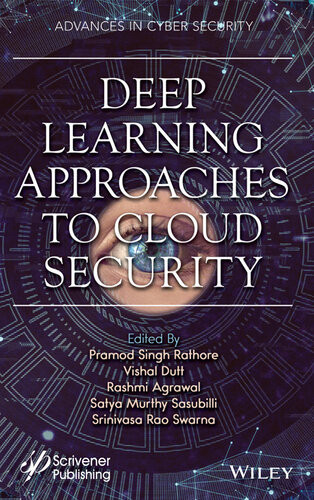

Most ebook files are in PDF format, so you can easily read them using various software such as Foxit Reader or directly on the Google Chrome browser.
Some ebook files are released by publishers in other formats such as .awz, .mobi, .epub, .fb2, etc. You may need to install specific software to read these formats on mobile/PC, such as Calibre.
Please read the tutorial at this link. https://ebooknice.com/page/post?id=faq
We offer FREE conversion to the popular formats you request; however, this may take some time. Therefore, right after payment, please email us, and we will try to provide the service as quickly as possible.
For some exceptional file formats or broken links (if any), please refrain from opening any disputes. Instead, email us first, and we will try to assist within a maximum of 6 hours.
EbookNice Team

Status:
Available4.5
21 reviewsCovering one of the most important subjects to our society today, cloud security, this editorial team delves into solutions taken from evolving deep learning approaches, solutions allowing computers to learn from experience and understand the world in terms of a hierarchy of concepts, with each concept defined through its relation to simpler concepts.
Deep learning is the fastest growing field in computer science. Deep learning algorithms and techniques are found to be useful in different areas like automatic machine translation, automatic handwriting generation, visual recognition, fraud detection, and detecting developmental delay in children. However, applying deep learning techniques or algorithms successfully in these areas needs a concerted effort, fostering integrative research between experts ranging from diverse disciplines from data science to visualization. This book provides state of the art approaches of deep learning in these areas, including areas of detection and prediction, as well as future framework development, building service systems and analytical aspects. In all these topics, deep learning approaches, such as artificial neural networks, fuzzy logic, genetic algorithms, and hybrid mechanisms are used. This book is intended for dealing with modeling and performance prediction of the efficient cloud security systems, thereby bringing a newer dimension to this rapidly evolving field.
This groundbreaking new volume presents these topics and trends of deep learning, bridging the research gap, and presenting solutions to the challenges facing the engineer or scientist every day in this area. Whether for the veteran engineer or the student, this is a must-have for any library.
Deep Learning Approaches to Cloud Security:
Audience: Computer scientists, scientists and engineers working with information technology, design, network security, and manufacturing, researchers in computers, electronics, and electrical and network security, integrated domain, and data analytics, and students in these areas